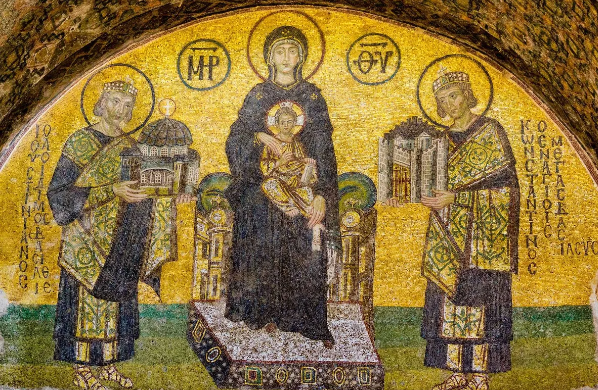This article is a preview of Michael Witcoff’s upcoming book, scheduled to be published next year.
Let us analyze Jewish life in Christian Imperial Rome. More specifically, we will examine laws implemented by Royal Saints on the topic of Judaism from the rise of Emperor St. Constantine in the early 4th century to the 6th-century reign of Emperor St. Justinian. A brief introduction to the topic is necessary, as it’s not quite as simple as an Emperor’s decree taking immediate effect throughout the Roman Empire.
To begin with, the vast majority of the relevant laws are contained within the Theodosian Code and the Justinian Corpus. At the time of their compilation, both of these legal codices were considered authoritative sources of Roman law. As the Justinian Corpus was put together centuries after the Theodosian Code, a fair amount of it reiterates, edits, or updates what was compiled by Emperor St. Theodosius II. One complicating factor in properly understanding these laws is that when they were brought together into these official compilations, the editors deleted the preambles which originally explained the context, circumstances, and situations which brought about the need for each law to be drafted. For example, we often read in these legal codes that the Emperors addressed particular individuals in response to a petition…but we do not know exactly what brought about said petitions in the first place. It is also not always clear whether the laws were meant to be published throughout the Empire or only implemented in the specific regions named by the Emperors in their responses.1 As a general rule, a law decreed by an Emperor was considered to be permanent in the Empire unless specifically redacted by a future one. Hence we often find, when reading through the laws, references to the rulings of “the ancient emperors” and “the former laws.”2
Further nuance is required because Emperors rarely ruled over both halves of the Empire at once, and after the First Novel of St. Theodosius II, laws passed in the East were typically not promulgated in the West (or vice-versa). In that document, he ruled that laws enforced in one half of the Empire were not to be enforced in the other unless that second half also explicitly made the same decree. Thus we are presented with a situation in which the Eastern Roman Emperor, for example, may not even have been aware of laws passed by the Western Emperor.3 The Theodosian Code itself was promulgated in both halves of the Empire within a year of its publication, however, and its most religious section (Book 16) was even accepted by the Church as an authoritative source of Canon Law.4 The Justinian Corpus likewise became law for both halves of the Empire when it was published.
Roman Imperial Law used two terms to describe various religions, “religio” and “superstitio.” Generally speaking, Emperors used “religio” when describing a religious group in a positive context and “superstitio” when speaking or writing with condescension. In the pagan Roman Empire, “religio” typically (but not always) meant the Roman state religion, while “superstitio” meant anything foreign or hostile to it; once the Empire became Christian, “religio” meant Christianity, and “superstitio” meant everything else. This distinction took a while to emerge and set completely, as before 416 both terms were applied to Judaism whereas afterward, Judaism was strictly “superstitio.”5 As noted by Amnon Linder in his book, “The Jews in Roman Imperial Legislation“, “The laws relating to the Jews fall into three main groupings: (1) those concerning relations between the Jews and the government; (2) those concerning relations between Jews and non-Jews; (3) those concerning relations between Jews and other Jews.”6 We will focus on the first and second types, as the internal relations of the Jewish community are not relevant to our purpose.
Some of the relevant laws refer strictly to Jews or Judaism, but these categories were very often grouped with others such as Samaritans, pagans, and heretics. This distinction is important because it underlines a constant theme that the Saints were more concerned with religion than with race; were biology their priority instead of faith, Jews would always appear by themselves in the legal codes. Instead, the majority of all laws that mentioned Jews between 408 and 545 grouped them together with pagans and heretics; Linder explained that this “indicates a fundamental change in the Jewish policy of the Imperial government towards the beginning of the fifth century, and was bound to affect the legal status of the Jews during that period. Throughout the greater part of the fourth century the Jews still benefitted from the legal status Tertullian defined as ‘religio licita,’ a religion recognized and protected by the State. By the end of that century, however, the State tended to assimilate them into other religions and sects prohibited, or severely restricted, by law, and to apply to the Jews interdictions and restrictions formerly applied against pagans and heretics only.”7 Furthermore, Jews who converted to Christianity were not referred to, in Imperial Law, with the term “Jew;” the word only, and specifically, referred to non-Christians and never to a Christian of Jewish ethnicity. For this and other reasons, false conversions from Judaism to Christianity appear to have been relatively common and as much a cause of concern for the Roman Empire as it was for the Orthodox Church. More on that shortly.
“…it is perfectly absurd to permit impious men to deal with sacred matters.”
As I sat down to examine the role of Jews and Judaism in Christian Imperial Law, I hoped to find a consistent thread of legal decrees which demonstrated – in an unbroken chain, passed down from generation to generation – the mind of the Church expressed clearly and firmly. If that turned out to be the case, so I thought, then the information I discovered could provide an eternal witness to the Holy Spirit’s guidance on this topic. As you’ll learn in just a moment, there is some element of accuracy to this notion; despite occasional deviations and exceptions, certain aspects of the Christian Roman legal codes tended to communicate similar views over the centuries. In other ways, different Royal Saints had different views at different times. Often they agreed with each other and accepted the rulings of their predecessors. Other times they did not, and changed course in light of a new context. Sometimes the same Saint would change his mind on a given topic; for example, Emperor St. Theodosius II ruled in 417 that Jews could inherit Christian slaves on the condition that said Jews did not circumcise or otherwise try to convert them. A few years later, in 423, he updated his previous ruling and forbade Jews from owning Christian slaves altogether.8 And despite such laws, there is also evidence that the Empire often had trouble enforcing them. This phenomenon is demonstrated simply by the number of times that laws regarding Jews and Christian slaves had to be passed by different Emperors, including a law issued by Emperor St. Justinian in 534 which implied that Jews in Africa still owned Christian slaves despite its having already been illegal for a century.9
The lack of Imperial persecution of Jews came as a major surprise to me. I dove into the legal codes expecting to find a harsh and unfair treatment of Jews based on rumors I’ve heard throughout my life…and yet, when I actually read what the Saints said, the truth was almost always the opposite. Our Royal Saints indeed spoke ill of Judaism and the people who practiced it, regularly referring to Jews with terms like “nefarious,” “impious” or “sacrilegious” and to Judaism itself as a “disease,” “contagion,” “perversity,” “superstition,” “insanity,” “madness” and “plague.”10 But when it came to practical action, Christian Roman Emperors universally forbade violence against law-abiding Jews and the synagogues in which they gathered. Based on comments from the Emperors themselves, it appears that Christian fanatics often took justice into their own hands and attacked people of other faiths along with their houses of worship. Thus we find laws protecting synagogues beginning with Emperor St. Theodosius I, through Emperors Honorius and Arcadius, and down to Emperor St. Theodosius II and beyond.11 Again we see the phenomenon of Emperors having to issue the same law many times due to its not being properly enforced, as when St. Theodosius II warned Christians in 423 not to injure “peaceful Jews and pagans who are not attempting anything seditious or unlawful.”12 It should be noted that despite the Royal Saints’ protection of existing synagogues, they also forbade Jews from building new ones.13
We find the only exception to the general protection of synagogues in a law from St. Justinian, issued in 535, which placed severe limitations on the activities of Jews, heretics, and pagans in Africa. The law was a response from the Emperor to a request from that year’s Council of Carthage asking the government for “a more militant policy against the Arians.”14 In a severe and sweeping measure, St. Justinian ordered that all Churches and Church vessels be immediately confiscated from heretics and returned to the Orthodox Church. He further reiterated the warning against Jewish ownership of Christian slaves, ordered that all synagogues be converted into Churches, and forbade all non-Orthodox in the region from either holding public office or practicing their religions at all – “for it is perfectly absurd to permit impious men to deal with sacred matters.” As to heretics in government, St. Justinian explained that they: “shall not be allowed to administer any public office neither shall they serve in any public administration out of any ambition, lest the heretics be seen to have been placed over the Orthodox to rule them, when it is enough for them that they stay alive, certainly they shall not demand any authority for themselves and afflict through it suffering on Orthodox people and on the most righteous worshippers of God Almighty.”15 It appears that some of the harsher rulings in this law may have contributed to local riots in the following year – and they may have even been repealed as a result, as they were not included in future summaries of the law. It is worth mentioning that this was not the first time Jews had been banned from all but the most basic government jobs; St. Theodosius II, along with Emperor Valentinian III, had already banned Jews, Samaritans, pagans, and heretics from such roles just under a century earlier.16
“…whatever differs from the faith of the Christians is contrary to Christian Law…”
While Jews were universally protected from harassment or violence conducted by those falsely claiming to act “under the cover of venerable Christianity,”17 Royal Saints also insisted that Jews could not mock or harm the Orthodox Faith. For example, a law issued by Emperor St. Theodosius II in 408 dealt with a Jewish tradition at the time in which an effigy of Haman was crucified and burned during the celebration of Purim. This was taken to be a mockery of Christ’s execution and led to at least one violent riot. Thus, St. Theodosius II outlawed the practice: “The governors of the provinces shall prohibit the Jews from setting fire to Aman in memory of his past punishment, in a certain ceremony of their festival, and from burning with sacrilegious intent a form made to resemble the saint cross in contempt of the Christian faith, lest they mingle the sign of our faith with their jests, and they shall restrain their rites from ridiculing the Christian Law, for they are bound to lose what had been permitted them till now unless they abstain from those matters which are forbidden.”18 Such bans on non-Orthodox vitriol against Christians were not, however, limited to Jews; a few months after the Purim ruling, St. Theodosius II issued another law (this time with Honorius) cracking down on anti-Christian violence in Africa. More specifically, riots and harassment by Jews and Donatists had reached such a fever pitch that clergy across the region were being assaulted. That, together with the constant interruption of Orthodox services, led the Emperors to order that “a just and retributive chastisement be inflicted upon those who shall attempt to do anything that is contrary and adverse to the Catholic sect.”19 A similar law, passed the following year, confirms the cooperation of Jews with schismatics and heretics in trying to cause harm to the Orthodox Church.20
One of the reasons that our Royal Saints forbade Jews from owning Christian slaves or building new synagogues was to prevent Jews from converting Christians to Judaism. We find this particularly explicit statement in 409, in a law issued by Emperors Honorius and St. Theodosius the II: “For it is certain, that whatever differs from the faith of the Christians is contrary to Christian Law. Some people, moreover, oblivious of their life and their position, dare to transgress the Law to such an extent, that they force some to cease being Christian and adopt the abominable and vile name of the Jews. Although those that have committed this crime shall be legally condemned under the laws of the ancient emperors, still it does not bother us to admonish repeatedly, that those imbued in the Christian mysteries shall not be forced to adopt the Jewish perversity, which is alien to the Roman Empire, and abjure Christianity.”21 Though Arian and not a Saint, Emperor Constantius II was so concerned about Christians leaving the faith for Judaism that he even ordered the confiscation of all a proselyte’s property.22 Thus we see that as with the Canons of the Holy Orthodox Church, the religious laws of the Christian Roman Empire were mainly concerned with the danger of Christian apostasy. The laws, like the Canons, were designed to help keep Christians within the bounds of the Christian faith. The limitations placed on other religions – and the rhetoric that went along with them – seem to have existed largely in service of that goal.
A 383 law issued by Emperors Gratian, Valentinian II, and St. Theodosius laid heavy penalties on the heads of converts from Christianity to other religions. Under this law, Christians who converted away from the true Faith lost the right to bequeath their property to their families in a will. Converts to Judaism and Manichaeanism were to be given harsh (but unspecified) penalties along with whoever was responsible for persuading the Christian to join those faiths instead of remaining with the Church. This law appears to have been aimed at both those who actually converted away from Christianity and those who remained formally Christian but participated in the services of other faiths.23 Another Imperial measure, issued in 388 and with a clear parallel to the Church’s Canons, forbade marriage between Christians and Jews on pain of the same civil penalties typically imposed for adultery. By promulgating this law, intended to maintain the purity of the Christian Faith, Emperors added State punishment to what was already, by then, an excommunicable offense to the Church.

The harshest law from an Emperor Saint in this regard is also the first ever issued on the topic. Not only was it an Imperial priority to protect Christians from being led astray, but Jewish converts to Christianity must have been particularly vulnerable; in 329 Emperor St. Constantine issued the following decree: “We want the Jews, their principals and their patriarchs informed, that if anyone – once this law has been given – dare attack by stoning or other kind of fury one escaping from their deadly sect and raising his eyes to God’s cult, which as we have learned is being done now, he shall be delivered immediately to the flames and burnt with all his associates. But if one of the people shall approach their nefarious sect and join himself to their conventicles, he shall suffer with them the deserved punishments.”24 He reiterated this law again in 335: “If one of the Jews shall unlock for himself the door of eternal life, shall bind himself to the holy cults and choose to be Christian, he shall not suffer ought of harassment or molestation in the hands of the Jews.”25 From these laws, and the Saint’s commentary, we can discern some very illuminating information. Firstly, we learn that Jews harassed their own converts to Christianity with such malice and regularity that the Emperor himself was forced to intervene. Secondly, we can see a plain example of the aforementioned phenomenon that the Saint’s view of Jews was more religious than biological; by embracing Christianity, a Jew was no longer considered to be a part of “the Jews” but rather of Christianity (“God’s cult”). None of the Royal Saints I’ve studied deviated from this perspective.
We find another drastic ruling issued by Emperors Valentinian III and St. Theodosius II in 425. In order to reaffirm the power of Christians in the Empire while minimizing the influence of the non-Orthodox, a number of laws were promulgated which undid anti-Christian laws passed by the false emperor Johannes while kicking the non-Orthodox out of major cities. In addition, Jews and pagans were banned from practicing law or serving in the Imperial administration on the grounds that they were likely to misuse their power over Christians.26 As with similar cases, the justification for these laws was the well-being of Christians and to prevent them from being exposed to noxious spiritual influence: “We order that the Manichaeans, all the heretics or schismatics and astrologers, and every sect hostile to the Catholics must be expelled from the very sight of the various cities, so that they shall not be defiled even by the contagious presence of the criminous. We also deny to the Jews, and to the pagans, the right to practice law and to serve in the State service; we do not wish people of the Christian Law to serve them, lest they substitute, because of this mastery, the venerable religion by a sect.”27 The following section of the law grants schismatics in particular a short period of time to repent from their errors and rejoin the Church: “We grant them a delay of twenty days, beginning with the day they are warned. Unless they return to the communion’s unity within this period, they shall be expelled to the hundredth milestone, and waste away in the wilderness they have chosen.”28
Of all the Emperor Saints in our study, St. Justinian seems to have been most familiar with Jewish teaching and, subsequently, we find the outlawing of several Jewish traditions in his final ruling on the topic. In that ruling, issued in 553, the Saint forbade the teachings of the Sadducees who, unlike the Pharisees, denied the resurrection of the dead and other ancient Jewish teachings fulfilled in Christianity. Further, he demanded that Jews use the Septuagint or a similar translation whenever conducting their services in Greek due to the fact that many post-Apostolic translations of the Old Testament intentionally edited the wording of prophecies so that Christ appeared not to have fulfilled them. Finally, he completely banned the use of the Mishnah – the collection of Pharisaic oral traditions which would later be codified into the Talmud – “which he condemned, in accord with the well-known patristic usage, as an entirely human tradition, devoid of any Divine inspiration, origin or authority, and contrary to Christian faith.”29 Breaking these laws brought down penalties including the confiscation of property, exile, or corporal punishment. Earlier, in 531, St. Justinian forbade Jews and pagans from testifying against Orthodox Christians in court.30
The preeminence of Orthodox Christianity – especially given its emphasis on mercy and forgiveness – naturally led to false conversions in order to escape from material punishments and find cover under the Church’s loving wings. This seems to have been a relatively constant theme for Jews, toward whom several related laws were promulgated. For example, a 397 law issued by Emperors Arcadius and Honorius insisted that Jews could not join the Church to avoid either paying debts or being punished by the courts in criminal proceedings. Thus, Jewish converts were to be refused reception in the Church until all their debts were paid off and/or the individuals in question were cleared by the State of criminal charges. In his commentary on this law, Linder added: “It seems that the Church cooperated with the State in the application of the present law, for the ninth century text of the obligatory oath taken by Jewish converts to Christianity still included the declaration that the convert’s acts were motivated by love for Christianity and not by fear from criminal charges preferred against him or for similar reasons.”31 A few decades later, in 416, a related law was passed by Emperors Honorius and St. Theodosius II to follow up on the first ruling: whereas converting from Christianity to Judaism was typically punished (and prevented whenever possible), Jews who had converted under false pretenses were allowed to return to Judaism unharmed. The Emperors justified this decision with the belief that letting false converts to return to their original faith was “of greater benefit to Christianity” than allowing them to stay.32 Thus we can see the spiritual tightrope walked by these ancient Saints; the Emperors promoted the superiority of the Orthodox Church, while their laws and the Church’s Canons made sure to clamp down on the false conversions that followed from the benefits of being Orthodox. This balance seems to have required constant upkeep and maintenance as evidenced by the regular reissuing of previous Laws and Canons.
In conclusion, Orthodox Royal Saints extended legal protection to law-abiding Jews while using the power of the Empire to prevent Jews from harming Christians, converting Christians to Judaism, or spreading Judaism throughout the Empire in general. This sentiment is perhaps best exemplified in the following ruling from Emperors Honorius and St. Theodosius II in 420:
“No one shall be destroyed for being a Jew, though innocent of crime, nor shall any religion whatsoever execute him while he is exposed to contumely. Their synagogues and habitations shall not be burnt up indiscriminately, nor wrongfully damaged without any reason. For even if someone is entangled by his crimes, the vigour of the courts and the protection of public law appear to have been instituted in our midst for this very reason, that no one shall have the power to permit himself to take vengeance. But, just as we wish to provide in this law for all the Jews, we order that this warning too should be given, lest the Jews grow perchance insolent, and elated by their security commit something rash against the rever[e]nce of the Christian cult.”33
The Royal Saints’ main spiritual priority was the growth and maintenance of Christianity; their main concern was losing members of the flock. Even if the laws were not always entirely consistent, the perspective and reasoning behind them fit under the same umbrella beneath which we find the Canons. And hence we see exemplified the Orthodox symphonic model: Church and State working hand-in-hand to shepherd souls toward Christ. May God grant all who hold power in this world the wisdom and discernment to do likewise.
Footnotes
- Linder pg. 18-20
- Linder pg. 25
- Linder pg. 26
- Linder pg. 33
- Linder pg. 56-57
- Linder pg. 67
- Linder p. 62-63
- Linder pg. 83
- Linder pg. 83
- Linder pg. 60
- Linder pg. 74
- Linder pg. 65
- Linder pg. 74
- Linder pg. 381
- Linder pg. 386
- Linder pg. 325
- Linder pg. 86
- Linder pg. 236-237
- Linder pg. 240
- Linder pg. 244
- Linder pg. 258
- Linder pg. 153
- Linder pg. 169
- Linder pg. 126-7
- Linder pg. 146
- Linder p. 306
- Linder p. 308
- Linder pg. 309
- Linder pg. 404
- Linder pg. 371
- Linder pg. 199
- Linder pg. 276
- Linder pg. 285

Michael Witcoff is a Jewish convert to Orthodox Christianity and the best-selling author of On The Masons And Their Lies. He also wrote Theopoetica, a book of classical Christian poetry, and runs the Brother Augustine ministry on YouTube, Telegram, and Gab.





